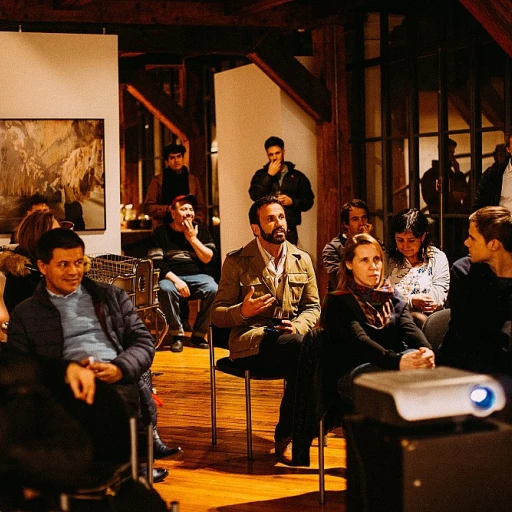
The Evolution of Job Titles
From Formal to Funky: A Historical Perspective on Job Titles
The way we label our roles within companies has undergone significant transformation over the years. Traditionally, job titles were straightforward and descriptive, clearly indicating the hierarchical level or specific function of an employee within the company. Titles like 'Manager', 'Officer', or 'Sales' were typical and carried a clear, unambiguous message about one's professional responsibilities. However, with the modernization of work environments and the emphasis on a more flexible workplace culture, there's been a visible shift in this convention. Today, it’s common to see job titles that are not only descriptive but also creative, humorous, and even quirky. Chief Happiness Officer, Full Stack Developer, Media Specialist, and Business Development Ninja are some modern examples that challenge the traditional norm in the corporate landscape. This evolution in job titles is not merely about adopting humor or standing out in the company culture. It's also about adapting to the digital age where individuals are defined not just by their skills but also by their unique contributions and creativity within the organization. It reflects broader changes in work values and cultural dynamics, encouraging an environment that celebrates individuality and innovation. The shift has also been accelerated by the role of digital platforms and social media, where having unique and catchy titles can aid in self-promotion and emphasize an individual's role in the work they do. This movement has seeded a thriving discussion on not only the effectiveness and personability of such titles but also the potential challenges they bring, which continue to shape how companies approach job descriptions. For more insights into how this transformation affects job advertising, enhancing job advertising with AI in human resources is a great resource.AI's Role in Shaping Modern Job Titles
The Influence of Artificial Intelligence on Job Titles
Artificial Intelligence (AI) has become a transformative force in shaping the ever-evolving landscape of job titles. Companies are increasingly leveraging AI to create more creative job titles that align with modern company culture and reflect the dynamic nature of today's business environment. From redefining traditional roles such as office manager to introducing unique positions like chief happiness officer, AI plays a pivotal role in the evolution of job titles.
One major trend propelled by AI is the creation of funny job titles that capture attention and engage potential candidates. These titles not only evoke a sense of humor but also effectively communicate company values and culture. For instance, a graphic designer might become a "Creative Wizard," while a manager social media specialist may be termed as a "Social Media Ninja." The introduction of such creative job titles is not only a marketing strategy but also a direct reflection of the creativity and innovation fueled by AI technologies.
AI-driven tools analyze various factors like job descriptions, industry trends, and candidate expectations to craft job ads that attract top talent. These tools can suggest titles that are not only compelling but also SEO-optimized to improve the outreach and visibility of job posts. For example, roles traditionally labeled as business development manager may now be posted as "Growth Arrow," capturing both the role's essence and innovative spirit.
Moreover, AI assists in predicting the success of job titles by utilizing data analytics to gauge their effectiveness in attracting candidates. This data-driven approach allows companies to test out various titles, refining them to better suit their specific needs and target audience. AI's capacity to test and adapt in real-time brings a level of precision previously unheard of in the realm of job title creation.
In conclusion, the pervasive impact of AI across industries ensures that job titles will continue to evolve, reflecting both the technological advancements and the inherent creativity of human resource strategies.
The Psychology Behind Humorous Job Titles
Why Humor is Essential in Job Titles
In the world of work, where the competitive landscape continues to evolve, adding a touch of humor to job titles can truly make a difference. It’s not just about being a 'Chief Happiness Officer' or a 'Full Stack Wizard'—these titles go beyond mere hilarity. They serve as a strategic tool for companies aiming to stand out in crowded markets. The psychology behind job titles that are funny is quite fascinating. For instance, a cleverly crafted job title like 'Marketing Guru' can invoke curiosity while simultaneously injecting a bit of fun into what can often be perceived as mundane work environments. These funny job titles can lighten the mood, promote a positive company culture, and ultimately increase employee satisfaction. Furthermore, humor in job titles has the power to shift company perceptions in the eyes of potential candidates. Posting these roles on social media or job boards not only captures attention but also reflects the organization’s creative edge. It suggests a culture that's open, innovative, and willing to break away from traditional norms—qualities that are often attractive to top candidates. In sales or digital marketing teams, for instance, having a 'Business Development Ninja' or 'Social Media Specialist Extraordinaire' can create an engaging narrative around the role. It transforms the view of the job from being just a post to fill, into a unique and alluring proposition. Companies that employ imaginative job titles are finding they’re able to lure high-caliber talent and improve retention rates by fostering a sense of belonging and identity among employees. People feel more inclined to take pride in roles with distinctive titles—making them more likely to engage wholeheartedly with their work and the broader company community. For those involved in crafting job descriptions or refining the recruitment process, considering a humorous touch could enhance the attractiveness of their advertisements. It’s worth exploring how to craft the perfect interview to attract candidates, allowing organizations to maintain an appealing front.”Case Studies: Companies with Creative Job Titles
Innovative Companies Embracing Quirky Job Titles
In the evolving landscape of job titles, several companies have taken a bold step by incorporating creativity and humor into their job descriptions. This trend not only reflects a shift in company culture but also serves as a unique marketing tool to attract talent. Let's explore some examples of companies that have successfully integrated creative job titles into their organizational structure.
Google: The "Chief Happiness Officer"
Google is renowned for its innovative approach to work culture. By appointing a "Chief Happiness Officer," the company emphasizes the importance of employee well-being. This title not only adds a layer of humor but also highlights Google's commitment to creating a positive work environment. The role focuses on ensuring that employees are satisfied and engaged, which ultimately boosts productivity and morale.
Airbnb: "Community Gurus"
Airbnb has redefined traditional roles by introducing the title "Community Guru" for their customer service representatives. This creative job title reflects the company's focus on community building and customer engagement. By using a title that resonates with their brand ethos, Airbnb effectively communicates the importance of community interaction and support in their business model.
Salesforce: "Digital Marketing Wizard"
Salesforce, a leader in cloud-based software, has embraced the trend of quirky job titles with their "Digital Marketing Wizard." This title not only adds a touch of humor but also conveys the dynamic and innovative nature of the role. By using such titles, Salesforce attracts creative and forward-thinking individuals who are eager to contribute to the company's success.
Amazon: "Full Stack Magician"
Amazon's use of the title "Full Stack Magician" for their software developers is a testament to their innovative spirit. This title captures the multifaceted nature of the role, emphasizing the need for versatility and creativity in the tech industry. By adopting such titles, Amazon positions itself as a company that values creativity and innovation in its workforce.
These examples demonstrate how companies are leveraging creative job titles to enhance their brand image and attract top talent. While these titles may seem humorous, they serve a strategic purpose in aligning with the company's values and goals. As we continue to explore the evolution of job titles, it's clear that creativity and humor are becoming integral components of modern business strategies.
Challenges and Criticisms
The Balancing Act of Innovation and Professionalism
The rise of quirky and humorous job titles in today's workplace isn't without its set of challenges and criticisms. While these titles can appear to foster creativity and enhance a company's image, they also run the risk of blurring lines that traditionally defined roles and responsibilities. When everything is labeled in jest, the clarity of roles such as office manager, customer service officer, or business development manager can sometimes be compromised. In many traditional work environments, job titles serve as a fundamental reflection of the individual's duties and expertise. For instance, a graphic designer and a media specialist have distinct spheres of duties which are immediately identifiable by their titles. The innovation of titles like "Chief Happiness Officer" or "Sales Ninja" can often obscure the explicit nature of these roles. People seeking clarity in job advertisements or job descriptions might find these titles enticing but vague in terms of actual job scope and expectations. Moreover, there's the consideration of how these titles affect the perception and seriousness of a company. While humorous and funny job titles can add a layer of interest and help improve company culture, they can also sometimes be viewed as lacking professionalism, especially in industries where traditional expertise and authority are highly valued. Candidates might question whether a workplace that provides such clever titles full of humor job takes their roles and career paths seriously. On social media platforms and as part of digital marketing strategies, quirky job titles can certainly draw attention and become part of top posts, yet they might not always convey the depth of skill or responsibility associated with traditional titles like "Full Stack Developer" or "Marketing Manager". The balance is essential to ensure that job posts reflect both the creativeness and the expertise needed for the roles. It's also worth mentioning that there is a segment within organizations where creative job titles are effectively embraced and do not deter professionalism. This can be particularly true within tech startups or creative industries, where adaptability and innovation in work roles align with a company's adventurous spirit. In summary, as catchy as they may seem, quirky job titles bring along their share of challenges. Companies should tread thoughtfully to maintain an equilibrium between adopting appealing titles and keeping the essence of job roles intact for both current staff and potential hires.Future Trends in Job Titles
Emerging Trends in Creative Job Titles
As we look into the future of job titles, it's clear that the integration of AI into human resources will continue to inspire creative job titles. These unique titles are becoming an essential part of company culture, aiding in the attraction of talent and differentiating brands in a sea of similar job descriptions. AI's role in automating and analyzing workplace dynamics encourages companies to think outside the box for titles that reflect their mission and values.
Expect to see more roles with titles like Chief Happiness Officer or Marketing Guru, as the trend of humorous job titles continues to grow. As the workplace evolves, the term 'job title' itself is likely to become more fluid, with greater emphasis on skills and competencies over traditional hierarchical terms.
Moreover, the rise of digital platforms and social media networks allows companies to leverage these platforms not only for recruitment but also to showcase their unique brand identity. Being creative with job titles can serve as an effective advertisement for the company's ethos and values, attracting like-minded individuals.
However, while humor in job titles can be engaging, companies must also tread carefully. These titles should accurately represent the role and responsibilities. Creative titles might capture attention, but they should not confuse potential candidates or obscure the importance of the job within the organizational structure.
The future will likely also see a rise in titles reflecting technology and innovation. For instance, positions like Full Stack Developer or Digital Marketing Manager are already common, but evolving tech trends will continue to redefine what these roles entail, potentially giving rise to new titles we haven't even imagined yet.
The challenge moving forward will be in balancing creative expression with clarity and function, ensuring that job titles are both engaging and practical for potential candidates. As companies strive to stay relevant in a competitive market, the evolution of job titles will undoubtedly play a strategic role in defining the workplace of tomorrow.













